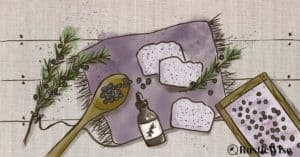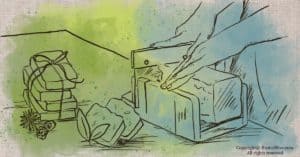Can You Use Bar Soap on Hair (Instead of Shampoo)?
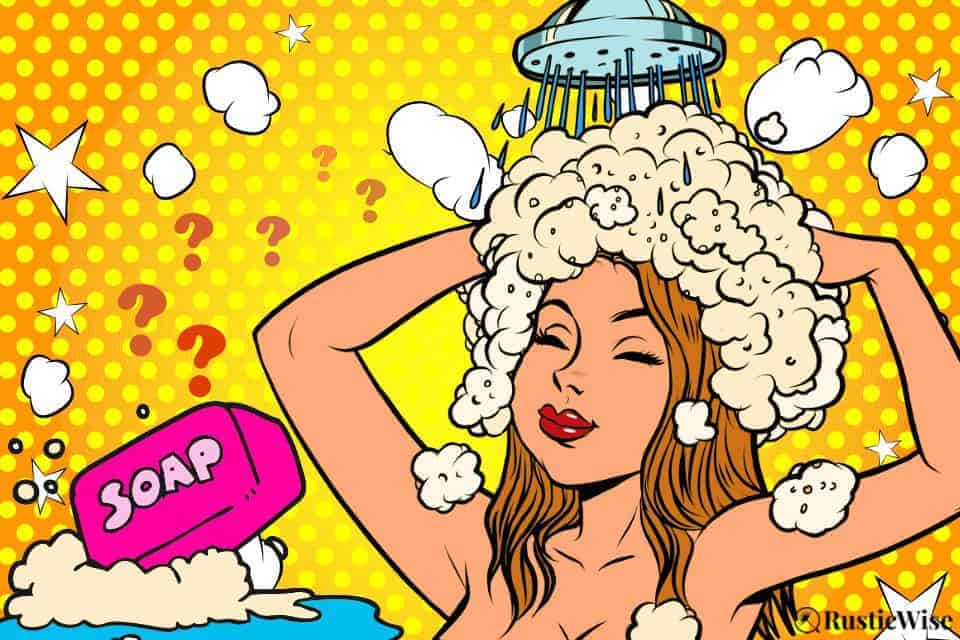
Whether you forgot to pack your regular shampoo while traveling, or are just trying to minimize the clutter in your shower, you might wonder, can you use bar soap on hair? Yes, you can use bar soap occasionally, but it’s not recommended for long-term regular use—especially if you have thick, long, coarse, or curly hair.
Using a plain old soap bar will not ruin your hair, but if you want to keep your locks shiny and healthy, most store-bought soaps are not formulated to maintain healthy hair.
The purpose of soap bars is to clean, and that’s just what they do. However, the secret to having healthy hair goes beyond just clean hair.
Liquid shampoos or shampoo bars provide conditioning properties that keep hair follicles moisturized and help maintain a healthy scalp.
We’ll look at how pH affects scalp and hair, what happens when you regularly shampoo with plain bar soap, and the importance of a vinegar rinse.
A note on soap bars, shampoo bars, and homemade soap bars
Just a note: I don’t sell soaps currently, but like making homemade soaps using natural ingredients. I try to use things that are natural and healthy, but realize that when it comes to hair care, it’s a very touchy subject (homemade vs. store-bought). There’s no one-size-fits-all solution, as everyone has a different hair type and preference.
Just so we’re on the same page, there are different soap bars out there. Let’s take a closer look at each.
- Store-bought soap bars: These are also known as syndet bars, or synthetic detergent bars. They contain surfactants such as sodium lauryl sulfate (SLS) which creates lather and helps remove dirt.
- Store-bought shampoo bars: Most store-bought shampoo bars contain SLS and are a variation of a syndet bar with hair nourishing ingredients added.
- Homemade soap: Depending on the fatty acid composition of the oils or fats used in the soap recipe, the soap can be mild and conditioning, to deeply cleansing. Most soap bars contain extra oils (superfat) for extra moisturizing properties. Since natural soaps are made with lye, they are alkaline.
- Homemade shampoo bars: Similar to homemade soap bars, DIY shampoo bars use skin and hair nourishing ingredients that strike a fine balance between cleansing power and conditioning. And like DIY soap, handmade shampoo bars are also alkaline.
Is using a regular soap bar bad for your hair?
Now to answer the question, can you use bar soap on hair…While using a plain old soap bar to shampoo bar isn’t necessarily a bad thing, the answer really depends on a variety of factors, such as:
- How often you’re using it;
- Hair type (fine, coarse, frizzy, or curly);
- Scalp condition (sensitive scalp or dandruff vs. normal or oily);
- Hair length (long or short); and,
- Water quality (hard water or soft water).
If you’re travelling and forgot to pack shampoo, sure, a bar of soap will do in a pinch. But, if you’re using a bar of soap to wash your hair regularly (several times a week), it’s not recommended. We’ll take a closer look at why in the next section about pH.
How regular bar soap (whether store-bought or homemade) affects your hair and scalp really depends on your hair type and your scalp’s condition.
If you have dry, thick, coarse, or curly hair, (and also if you have long hair) you’ll probably want to skip the soap bar on your hair. This is because soap bars may increase tangles or knots in your hair.
If you have a more sensitive scalp and experience dandruff, using a soap bar might aggravate the skin and strip the scalp of healthy oils.
Those with fine, thin, or short hair (with no scalp conditions) may have the best luck with using regular soap to wash hair.
Problems you may encounter with bar soap on hair
Here are a few common problems many encounter when using regular bar soap on hair.
- Soap buildup: If you’ve ever used regular bar soap on your hair, you might find it feels waxy afterwards. You may find your hair feels weighed down with regular use of plain soap. Unlike liquid shampoo or shampoo bars, body soap is formulated for use on skin, not hair. Typically, this means the soap may contain extra moisturizing ingredients that might make your hair feel like it has buildup. This is especially true for those with thicker hair, or oily hair. And if you have hard water, you might notice soap scum develop (which is no fun to have in your hair!).
- Hair breakage: If you’re left with soap buildup in your hair, it’s no surprise that you may also experience hair breakage when trying to brush hair afterwards.
- Knotty behavior: Most regular shampoos (and conditioners) detangle hair while regular bar soap does not.
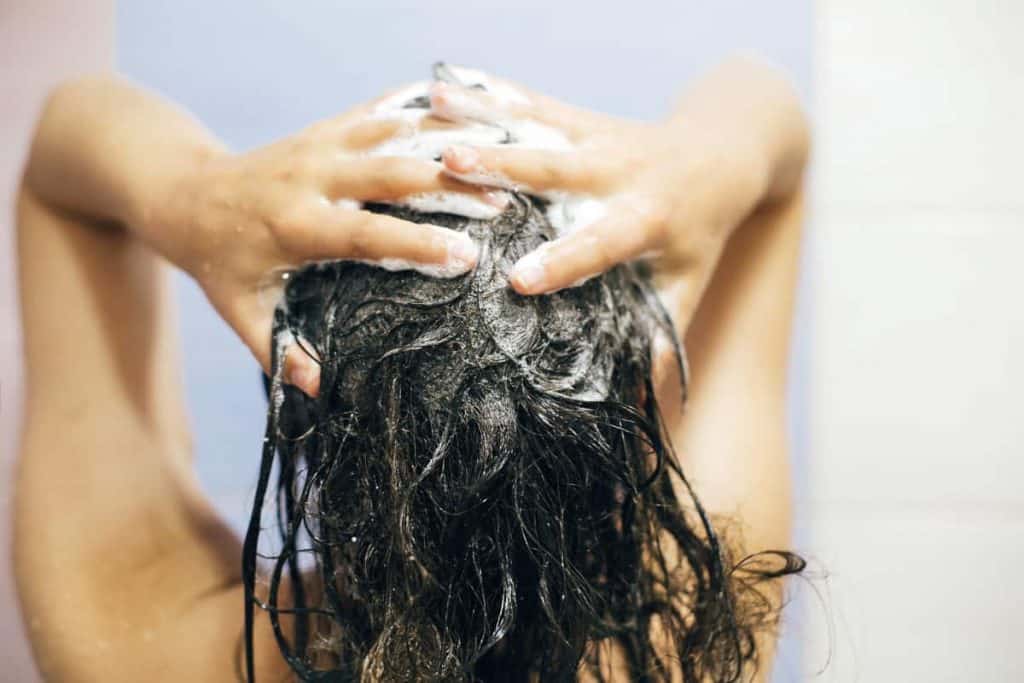
How pH affects your scalp and hair
The pH level of your scalp and hair leans acidic. According to a 2014 study, the scalp’s pH is 5.5, while the hair shaft pH is 3.67.¹
As a pH refresher, the pH scale runs from 0 to 14. A pH of 7 is neutral. Anything below 7 is acidic, and anything above pH 7 is alkaline or basic.

In the 2014 study, scientists analyzed 123 commercially available shampoos and their corresponding pH levels to see how it affected hair and scalp health.
They concluded that shampoos with a more alkaline pH, “may increase the negative electrical net charge of the hair fiber surface and, therefore, increase the friction between the fibers.”¹
In simple terms, more alkaline shampoos cause hair to be more frizzy and have more static.
It’s important to remember that most bar soaps are alkaline. While using alkaline soap on skin (such as for washing hands) isn’t a big deal, using an alkaline soap on hair long term may affect the look and feel of your hair.
To put things in perspective,
- pH of homemade soap bars: pH 8 or 9 and above (alkaline)
- pH of store-bought soap bars: varies greatly but most are alkaline too
What happens when pH of hair and scalp is disrupted
The term acid mantle refers to a protective layer on skin and hair. Since the natural pH of skin and hair is acidic, using products that are more alkaline may disrupt this natural balance.
So what can happen when you continually use an alkaline product like bar soap on your hair?
- Affects the scalp’s ability to fight off bacteria or fungus: Your scalp may experience dryness or itchiness. A constant application of an alkaline product weakens the scalp’s ability to ward off bacteria and fungus. A type of fungus called Malassezia may grow on the scalp and cause dandruff.²
- Hair becomes dry and dull: When you use a more acidic product (that’s similar to the natural acidity of hair), it closes hair follicles which makes hair look shiny; it also locks in moisture. Using a more alkaline soap bar will have the opposite effect—hair follicles open which makes hair look more frizzy. Once hair follicles are open, moisture escapes.³
- Hair breaks more easily: Once hair has become more dry, it’s also prone to breakage. Sebum is the natural protective layer that seals in moisture on the scalp and hair follicles. Using products that are more alkaline can strip away these natural healthy oils, leaving hair more brittle and less pliable.
The takeaway: Does this mean that you shouldn’t use homemade shampoo bars (that are more alkaline) for your hair? Not necessarily. Homemade soap or shampoo bars have many good things going for them—nourishing oils and natural ingredients. Many people choose to forgo store-bought to avoid use of synthetic ingredients or chemicals. If you’re using a more alkaline product, you may need to try a deep-conditioning solution, and an acidic vinegar rinse once a week. (More on this below.)
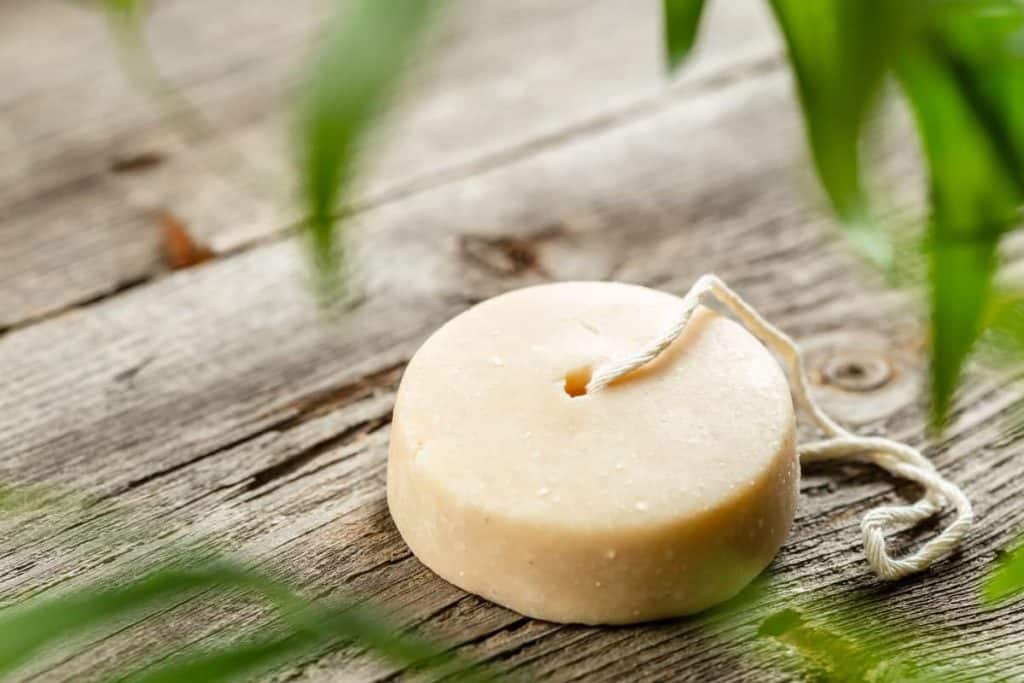
How are store-bought shampoo bars different from DIY shampoo bars?
Many people are choosing shampoo bars over liquid shampoos for several reasons. They are small and portable (which is convenient when travelling or camping). Plus, they use minimal packaging and no plastic (which is something we can all get behind!).
The major difference between commercially produced shampoo bars vs. homemade shampoo bars is the use of synthetic detergents or surfactants.
Store-bought shampoo bars are typically syndet bars (aka synthetic detergent bars). If you look at the ingredients, one of the first ingredients is probably a sulfate such as sodium lauryl sulfate (SLS).
Other common surfactants found in shampoos are sodium laureth sulfate, ammonium laureth sulfate, and ammonium lauryl sulfate.
Now, if you’re in the camp that frowns upon synthetic ingredients, you won’t be a big fan of syndet bars. However, note that synthetic detergents allow you to lower the pH level of the shampoo making them more acidic.
Homemade natural shampoo bars are made from scratch using sodium hydroxide lye. The lye and oils/fats/butters undergo a chemical process called saponification, which turns the oils into soap. (Don’t worry, there’s no active lye in the finished product!)
By nature of lye and saponification, it’s very difficult (if not impossible) to make a pH neutral, or acidic natural shampoo bar. Therefore, know that the natural shampoo bar you’re using is alkaline.
What’s the difference between a homemade natural soap bar and a natural shampoo bar?
Both natural soap and shampoo bars are made much the same way—through saponification. The key difference between homemade soap and shampoo bars is the oils (and the ratios of certain oils) used in the soap recipe.
Certain oils when used in high percentages are over drying (coconut oil, for example).
Some soapmakers will go with a lower superfat percentage in a shampoo bar so hair doesn’t feel weighed down with excess oils (if you’re making a shampoo bar for oily hair). On the flip side, some bump up superfat when formulating a bar for dry hair which has more moisturizing and skin nourishing properties.
After that, it’s really up to the individual soapmaker to customize the recipe to select oils, fats, or butters that promote a balance of cleansing, conditioning, and lathering properties.
Here are a few tips on formulating your shampoo bar:
- Go easy on the coconut oil: CO is known as a highly effective cleanser—one that’s so effective it can strip the hair of oils. Less is more when using CO (or other similar high cleansing oils).
- Add a bit of citric acid to prevent soap scum: Citric acid in soap helps prevent the formation of dreaded soap scum (which is a common occurrence if you have hard water). It also prevents oils from oxidizing.
- Select nourishing oils: Jojoba oil, almond oil, argan oil, olive oil, and grapeseed oil are all great choices for hair.
- Consider using additives: Honey is a great moisturizer. Powdered nettle has anti-inflammtory properties.
- Make it bubbly: Add a splash of castor oil for that bubbly feeling we all love in shampoos.
- Add a few essential oils: Cedar oil, lavender essential oil, rosemary oil, and sage oil are all great choices. Tea tree oil may help with dandruff.
How to use a bar of soap (or shampoo bar) for hair
Proper technique is key when forgoing liquid shampoo for bar soap (or a shampoo bar). Here’s how to get the most of that soapy bar.
- Dampen the soap bar with water.
- Thoroughly wet hair before applying soap bar.
- Apply the soap bar to your scalp in a “halo.” (Sweep the bar around the circumference of your head two or three times).
- Use your fingertips to gently massage the soapy suds onto the scalp. If you have longer hair, the ends will get clean as you rinse the soap out.
- Avoid applying the soap bar directly to the ends of your hair (if you have longer hair) as this may create tangles or dry out hair.
- Rinse well.
Alternately, you can also wet the soap and create a lather with your hands. Apply the soapy suds onto your scalp and hair with your fingertips.
Follow up with a vinegar rinse
If you’re using bar soap on the regular, make sure you use a vinegar rinse (about once a week). A vinegar rinse helps to close the hair shaft, making it smoother and shinier.
While most hair rinses call for apple cider vinegar (ACV), you can also use plain white distilled vinegar. ACV contains more nourishing elements and vitamins C and B and is slightly less acidic than white vinegar. Plus, it has a fruity smell that most people find more pleasant than straight-up plain vinegar.
Whichever type of vinegar you choose to use, don’t use undiluted vinegar on hair. It’s too acidic and may cause hair to become more dry or brittle.
In a clean bottle, make a solution of 3–4 tablespoons of ACV and 1 ¾ cups of water. Apply to wet hair after shampooing and conditioning. Carefully pour the vinegar solution onto your hair, making sure not to get it in your eyes. Let it sit for a couple minutes, then rinse thoroughly.⁴
If using white vinegar, use slightly less.
Can you use a shampoo bar for the body?
Sure, why not? A shampoo bar has most of the same ingredients as a regular bar of soap. If you’re looking to simplify your bath routine, this would be the route to take. Use a shampoo bar for hair and body.
The final word: can you use bar soap on hair?
Personally, I wouldn’t use a regular soap bar on hair. (If I had nothing else to use, then I would begrudgingly use it.) But, I wouldn’t make a habit of it. This is coming from a person who has long, thick, and coarse hair. If you have thin, fine, or short hair, you might find that bar soap works just fine on your locks and scalp.
As for shampoos, I’ve tried lots of them: homemade shampoo bars, store-bought syndet shampoo bars, and liquid shampoos.
Since I have a lot of hair, I found that some homemade shampoo bars left soap residue after a while. (I will give them another go and try to use more vinegar rinses.) I like the idea of less plastic, so have stuck with using syndet shampoo bars which work pretty well and leave my hair feeling clean and shiny for the most part.
Now that you’re armed with the knowledge of hair and pH, find what works best for you!
👉 If you’re wondering about using dish soap on hair, we have an article about that too!
New to making soap? 🧼❓
👉We have a fantastic overview on the whole soapmaking process here: read our Timeless Guide To Soapmaking.
If you would like to see our soapmaking posts organized by topic type, see our Soapmaking Collection.
Would you like more timeless tips via email?
Fun tips to help you live an independent, self-sustaining lifestyle. Opt-out at any time.


References
- Gavazzoni Dias, Maria Fernanda Reis et al. “The Shampoo pH can Affect the Hair: Myth or Reality?” International journal of trichology vol. 6,3 (2014): 95-9. doi:10.4103/0974-7753.139078
- ScienceDirect, Shampoo, https://www.sciencedirect.com/topics/chemistry/shampoo. Accessed January 2022.
- Rothstein, A. (27 January 2021). “What is the Best pH for Your Hair?”, Minnesota School of Cosmetology. Accessed January 2022.
- White, Adrian (31 October 2021) . “Can Apple Cider Vinegar Benefit Your Hair?“, Healthline. Accessed January 2022.

Author: Theresa Tesolin
Theresa is co-founder of RusticWise. She helps people unleash their inner DIY spirit by encouraging them to get dirty and make or grow something from scratch.




